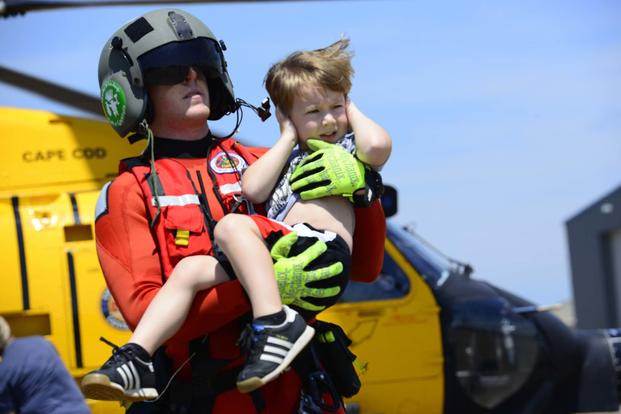Already strained by its response in the wake of Hurricane Harvey, the Coast Guard is now staging ships and gear for rapid rescues as Hurricane Irma makes landfall, the vice commandant of the service said Wednesday.
Adm. Charles Michel said he estimates Coast Guard personnel saved 11,000 lives in the wake of Harvey, which struck Houston, Texas, and the surrounding region, bringing massive rainfalls and widespread flooding.
But as work continues in the wake of that storm, some aircraft and other assets that assisted with Harvey relief will now prepare for Irma, a Category 5 storm that threatens the Caribbean and Florida.
"It stretched us just to be able to respond to Harvey, and now we're shifting resources right now to be able to respond to Irma," Michel told an audience at the Defense News conference near Washington, D.C.
Ahead of Irma, Michel said, all Coast Guard personnel in the Virgin Islands were evacuated to safety. The Coast Guard has boat forces detachments in St. Thomas and St. Croix.
Related content:
- Navy Helicopter Crews Home After Hundreds of Rescues in Flooded Texas
- National Guard Moves Focus as Hurricane Irma Looms
- Here's How Harvey Is Impacting Military, Veteran Benefits
- Almost 8K Troops Actively Engaged in Battling Harvey Aftermath
- 1st Cav Sends 400 Troops,100 Vehicles for Houston Hurricane Recovery
- What Hurricane Response Activation Means for National Guard Families
As of 2014, the service had 32 active military personnel and 30 auxiliary personnel stationed in the region, according to public documents.
While some Coast Guard boats are moving south to a strategic distance to avoid damage while the storm is raging, a number of aircraft will be stored in stormproof hangars in Puerto Rico, ready to assist survivors when called upon.
"Our hangars down there are built to withstand even more than this hurricane is probably going to be able to give us, and we've got a bunch of aircraft parked in there," Michel said. "... As soon as the storm gets past, you've got some aviation capabilities you can get in there."
The ships sent out of reach of the storm will move in rapidly in its wake, he said.
"Our ships are going to go down just far enough south that they can avoid the hurricane, and immediately come back because we want to get there as soon as humanly possible after the storm," Michel said.
"You've got to be there big, and you've got to be there fast," he said. "That's what our plan is going to be for Puerto Rico, and that's what our plan is going to be for Florida as well."
But will the chronically resource-strapped Coast Guard be overextended as it attends to storm relief?
Michel acknowledged that certain assets could maintain their aggressive workload for only a certain period of time before needing a break.
"You can only fly aircraft for so long before they lose maintenance and so on," he said.
But the Coast Guard hasn't hit its limit in crisis response. Michel noted that last week, while the service was focused on response to Harvey, Coast Guard assets elsewhere seized more than 10 metric tons of cocaine in successful drug interdictions.
"We're going to use these incidents to measure where capacity is and where gaps are," he said. "I'm confident that we're going to be able to respond to these as best that we can."
-- Hope Hodge Seck can be reached at hope.seck@military.com. Follow her on Twitter at @HopeSeck.
Related Video:
![]()





























